Joe Gilchrist bought the Flora-Bama exactly 35 spring breaks ago, which seems like the most fitting way to measure time here on the Alabama-Florida line. This location used to matter, back when blue laws prohibited Sunday alcohol sales in Baldwin County. Theodore Tampary, a Greek entrepreneur from Pensacola, was so dismayed by the thought of sending fishermen to sea without proper hydration that, in 1964, he launched a package store as close as the law would allow to Alabama’s thirsty shores. Gilchrist would come along and turn Tampary’s hut into a palace, a carnival, ruled in picaresque fashion by bachelorettes, band members and movie stars both real and pretend.
The day may come when this past generation of springtime revelers have children of their own and, as good parents, feel compelled to fill young ears with stories – legends, really – of the last American roadhouse. Tall stories, of local celebrities and famous characters, of flinging dead fish down the beach and of people using measuring tapes to see how far those fish flew. Stories so true the children may not believe a word, not until they have walked upon these woods themselves and discovered that what is said is so. Stories, as it turns out, best told by the men whose blood, sweat and beers turned the Flora-Bama into the good timers’ mecca it is today.
In the Beginning
Joe (president): I first came here and talked with [the original owners, ] the Tamparys about buying the place from them in ’77. I took over on my birthday: April 17, 1978. After that first year, the next September, we had Hurricane Frederic and it changed the whole area. When people got here after the storm to start rebuilding, real estate people started coming in and saying, ‘Hmm, this land sure is cheap compared to a lot of places.’ That was one of the first big building booms.
It was primarily a package store at that time. There was no live music when I got here, but I brought it in as soon as I could. Ken Lambert was my first musician. I went to South Carolina and asked him to come down here. We started off with just a little box of a room, with no bar or anything in it. I put up curtains and found a used carpet for about $20. Within four weeks, people were sitting on the floor.
After Lambert, the next regular player to entertain the bar’s growing crowd was Jay Hawkins. A 1983 sketch of the Main Bar shows a caricature of Hawkins, his name on the marquee, strumming a guitar in front of a sunrise pattern in the wall’s woodwork. Hawkins cut and built the motif himself in the Flora-Bama’s earliest days. Its pieces were saved and restored in the latest rendition of the Main Bar, where we sit today.
Jay (musician): I was living right down from here on the beach, house sitting. I came out one night when Joe had just opened up and saw Ken playing. There were no windows, just some tables, not even a stage. Joe would get people inside when they came up to buy package by saying, ‘I’ll buy you a drink if you’ll come back and listen for a little bit.’ Next thing you know, people started coming on a regular basis.
Joe: Anybody can buy a bottle of whiskey, go home and get drunk. The reason people go to a bar, the reason they’re willing to pay more, is the social aspect. It’s like belonging to a club. You can even listen to music at your house, but it doesn’t have the same environment. It doesn’t have the same cast of characters. People appreciate that.
The loudest of the group must be introduced before further ado. Pat McClellan speeds through his words the way a doctor would write them on a prescription pad and sometimes leans so far back to laugh that you try to catch him. After spending time in Pensacola’s Naval flight program, he ventured into a real estate career under famed Orlando developer Bob Snow, until falling prey to Gilchrist’s subversive recruiting tactics.
Pat (vice president): In 1985, Joe had our friend Jeff Nettles take me on an airplane ride with them. Joe didn’t say a thing; Jeff did all the talking. He said, ‘Here’s where the new golf course is and the new marina. Here’s where $500 million worth of hotels are coming in.’ Then he went over the Flora-Bama. Then he went over the Flora-Bama again. And again. I looked at all this empty beach and had been around enough to know this was gonna happen.
When I was leaving Bob Snow, who went on to be Florida Businessman of the Year and did millions of dollars of business all over, he took me to Orlando and said, ‘You mean to tell me you’re going to give up all this, just to shuck oysters, pop beer and listen to Ken Lambert at the Flora-Bama?’ I said, ‘Well, yeah.’ And he said, ‘Ya know, that doesn’t sound too bad.’
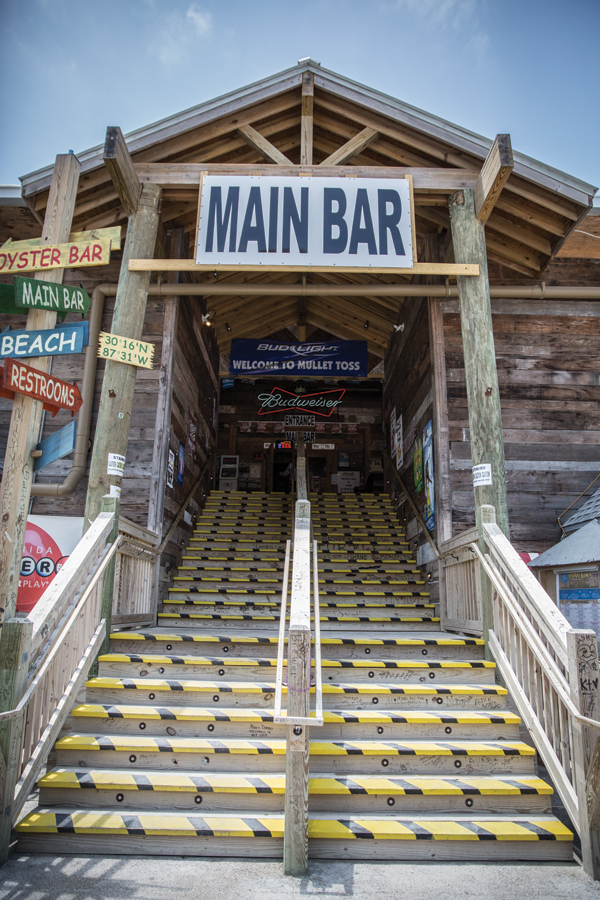

Guest Appearances
A pack of middle-aged motorcyclists enter the bar and survey the walls. “We were here a few years ago, ” one says, shaking Joe’s hand, “and it was just sort of tents between wood.” The men are on the first leg of a trip from North Carolina to Oregon.
Sitting at a nearby table, recently returned from her appearance on the TV series “The Voice, ” Shawna P. sips a bushwhacker with friends she has brought straight from the airport. Though she is originally from north Alabama, Shawna lives in Orange Beach and refers to the Flora-Bama as her home bar.
Shawna: My dad has had a condo in Orange Beach for about 28 years, so we’d come to the Flora-Bama on vacation. I’d tell my dad, threaten his damn life, like, ‘Daddy, don’t you tell these people I sing. This is my vacation.’ So I’d been watching people here for years and nobody knew who I was.
When they asked me on the show if I was upset about going home, they wanted me to give some sad, whiney story. I said, ‘Listen, y’all. I get to go back to the Flora-Bama. I get to sing by the beach and be with my people. What could be better than that?
Back at our booth, a question comes up that is often debated underneath the hanging bras: Has Mick Jagger really been here?
Joe: Not to my knowledge, although there’s rumors of such.
Pat: We don’t know exactly who’s been here and who hasn’t. There’s all sorts of rumors.
Joe: Exactly. Most big-name people don’t say anything.
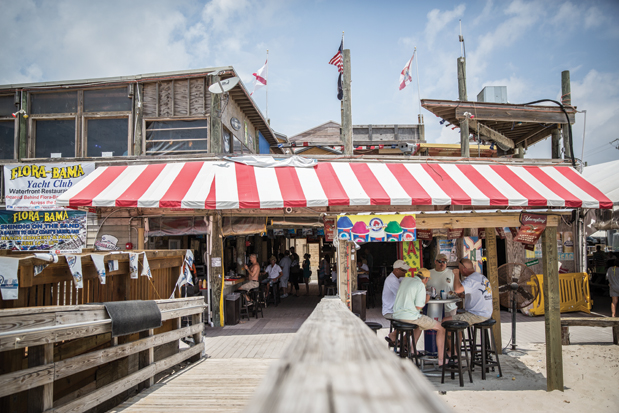
Pat: A lot of famous people like it because they can come in anonymously, and no one knows they’re here. That happened with Jimmy Buffett one time. Jay was playing, and Jimmy was over by the bar, very low profile. Jimmy had asked about going on stage, and Joe said it was no problem. I put “Stars Fell on Alabama” on the jukebox and got up to introduce him by saying, ‘This guy here says the guy on the jukebox sounds a little tinny.’
Jay: I had taken a break and set my guitar down. I was walking to the front package store, and something in me said to turn around. I looked and there was somebody on stage picking up my guitar. I hadn’t given nobody permission to grab my guitar, so I was ready to go back in there and say something. When I got up to him, he turned around, and it was Buffett. So I said, ‘Okay, well here’s the volume knob.’
Pat: You just never know. One of the best [jazz musicians from New Orleans], Pete Fountain, shows up and plays.
Joe: I let him use my house.
Pat: Yeah, he was on vacation and just wanted to play a little bit. I called my dad, and said ‘Hey, guess who this is?’ And I stuck out the phone. He said, ‘That’s Pete Fountain!’
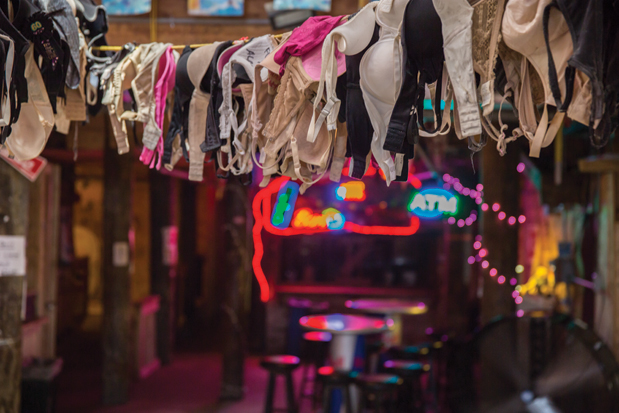
Jay: I opened for John Prine in ’88 over in Gulf Shores. When we got through doing the show, John came back to the Flora-Bama. When we got here, he just got up on stage and started playing. By that point, it was pretty much closing time. Joe went and locked the front doors, and we had a private concert with John Prine.
Joe: One of the greatest musicians to ever play here is Mickey Newbury. I was a big fan of his music and had been trying to get him down here for years but didn’t have a connection. Bo Roberts called me from Nashville, I asked him and Mickey said, ‘Okay, I’ll do two gigs down there for umpteen hundred dollars, ’ which was a lot more than I could afford. He came in for two days, stayed a month. He went back to Oregon, came back and stayed six months.
Pat: This is an interesting story. One week we had Russ McEwing and Mike Fisher playing, some old favorites. It was the same week Mike Ditka took over the New Orleans Saints. There was that big hoopla about them paying him all that money. He spent every single night here, Monday through Friday, closing up the Flora-Bama. And he was playing 27 holes of golf every day, something like that. Maybe that’s one of the reasons he didn’t stay with the franchise. But, Mike Ditka was here all week. Bobby Cox, the manager for the Atlanta Braves, was here that Sunday. On Saturday, for three hours straight, John Grisham was here listening to all of their songs and buying their albums, was John Grisham. He loved their music. I never knew who John Grisham was except when I saw the leaf on the back of a book and recognized the guy I’d seen at our bar.
Joe: He was nice enough to mention us in his book, “The Firm.” I was actually flying on Botswana Airlines in Africa one time. My stewardess came up and saw my John Grisham book. She said, ‘Oh, I’ve read that, ’ with a great British accent. I said ‘Really? It’s about my bar. Or at least we’re mentioned in it.’
Pat: Kenny Stabler’s always been one of our regular characters. He used to come out and throw the fish for us. One of the years with the worst weather, like 25 degrees and sleet, we got worldwide coverage – Japan, Germany, all sorts of places. Kenny used to throw the fish and try to spiral it, and it’d just go pfff, entrails coming out. So he comes back and is telling us a story about being over at an airport in London, right? And this old lady comes up to him and points and says, ‘You’re uh…’ and he starts kind of bowing out his chest. ‘You’re, uh…you’re…’ He nods and says, ‘I’m Kenny Stabler, yeah. Quarterback for the Oakland Raiders.’ ‘No, no, no, ’ she says. ‘You’re the guy who threw that fish!’

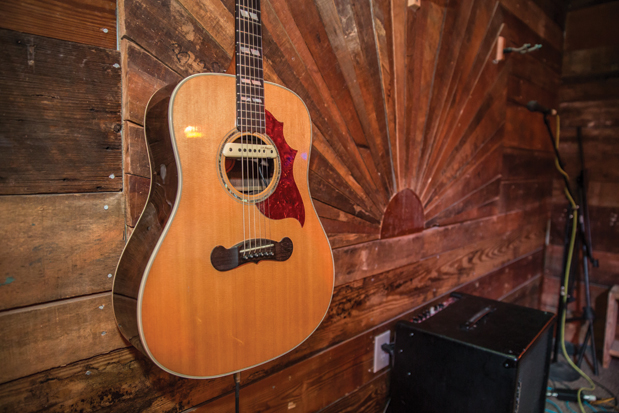
Calendar of Events
Pat: My first winter here, in ’85, I held the first Polar Bear Dip. I’d been doing it over on Pensacola Beach and brought the crew over. I think we had maybe 12 people here the very first year. Now, it’s 2, 500 or 3, 000 people. Amazing.
So we went on to spring, trying to develop something for the bumper season. I said, ‘We’re going to have the world’s longest beach party! We’ll do an interstate tug-of-war, with musicians and all the local sports teams.’ We had Emmitt Smith down here one year, pulling for his state.
Jimmy Louis, one of our musicians, said ‘How about a mullet toss? I used to throw discus and shot put.’ I said, ‘Mullet toss? Fine. We’ll draw a little circle, put something out there, sure.’ And as it turns out, the mullet toss of all events becomes the big attraction. Now it’s turned into a three-day weekend where people plan their whole vacation around having a good time throwing fish and just enjoying the people.
Jay: One of the things that makes this place work so well is that the people come from all the walks of life. You can be sitting here with bikers, senators, old, young. It doesn’t make any difference. It’s a real cross-section of people who all intermingle and have a good time.
Joe: It’s a microcosm of the way life should be in much broader areas. People having respect for each other and for society.
Pat: If only more people would just take down their fences. I always tell people, ‘Turbans to tattoos, it doesn’t make any difference here.’
Joe: Stabler used to say, ‘Bikers to brain surgeons.’
Pat: That’s an even better one. I still remember my first night here, Joe said, ‘The simple rules we have are no weapons and no [gang] colors.’ This guy came up to me from a biker crew with his loaded .38, said ‘Here. I know the rules, ’ and handed it to me to check behind the front desk at the package store. It was like the Wild West.
One of the most unlikely happenings at the Flora-Bama in recent years has been the installment of a Sunday church service. The Perdido Bay United Methodist Church, just a mullet’s throw from the state line, began Worship on the Water in 2011, underneath the bar’s outside tent.
Pat: I used to kid the pastor – Darren Michael McClellan, no relation – about the ministry giving us McClellans a bad name. They asked us about having church here on July 3. I said ‘July 3?! Do you know how busy it’s gonna be July 3 at the Flora-Bama?’ Then I stopped and said ‘No, no. It’s a mission, like going to Africa.’ So I finally said OK. Then I found out he’d already printed and disseminated a thousand bottles of water at all the public beaches with the date and time. So it happened and has become very successful. We now get 500 people here every Sunday. There were 2, 400 people on Easter.
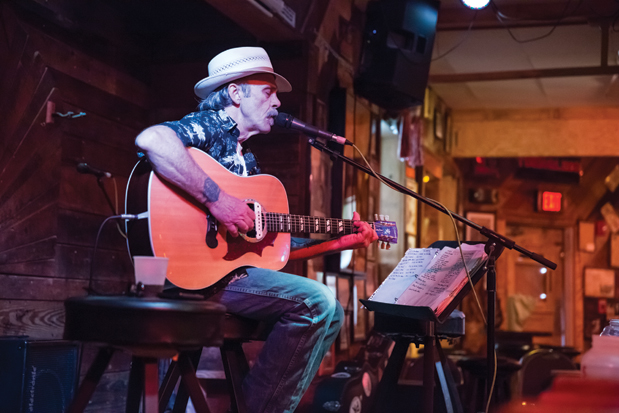
Joe: What in the world?
Pat: Twenty-four hundred people Easter Sunday. That goes with our policy of accepting people from all walks of life. Equal respect for all. That’s the way it’s always been.
Church service wasn’t the only act of benevolence to take off at the Flora-Bama. In addition to weekends packed with charity fundraisers, one small show of gratitude from the ’80s turned into an annual tradition: the Frank Brown International Songwriters Festival.
Joe: The songwriters event is an evolution of one Sunday in the fall we started doing for Mr. Frank Brown. Mr. Frank was the night watchman here for many years. This place was so far out in the middle of the wilderness, you couldn’t count on police protection. At night when they locked up, they used to lock Mr. Frank inside. He was just an amazing man, a wonderful character. One day he came to me and said, “Mr. Joe, I always said I was gonna quit working when I got to be 87.” I thought he was about 60 or something. He said, “I’m gonna be 87 next week, and I see you need me, so I’m gonna stay.” He worked here till he was 91.
Our musicians would come out one Sunday in November, he’d bring his lady, we’d play music for him and show our respect. Then, more and more people started coming so it went from a Sunday thing to two weekends. Now we have about 30 locations that do it. It reflects well on the area.
Pat: Yeah, everything grew. And us along with it. Then came the ’90s, and eventually the storm of ’04 (aught four), Hurricane Ivan, which is where Cameron and John rode in on a white horse. They came to us just at the right time.
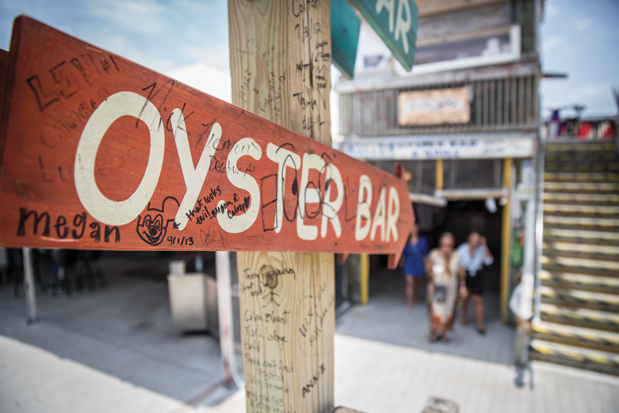
Surviving the Storm
Cameron Price is the youngest here by some 20 or 30 years, but with West Point and M.I.T. on his resume, it’s tempting to view him as a chaperone for the elders. He joined the Flora-Bama team in 2011, with friend and business partner John McInnis III, who became the majority owner of the bar. Price’s expertise played a helpful role in the rebuilding process, and he even devised a plan to turn rainwater into the toilet system.
Cam (general manager): When Joe and Pat came upon the Flora-Bama after the storm, it was completely devastated. It was filled with sand, everything destroyed. They had the foresight to pull all this memorabilia off the walls. Everything you see here – down to the wood paneling even – they pulled off and numbered it prior to demolishing the building. Which they did, what, I guess a year later.
Pat: When we were flying over, John Edd Thompson said, ‘Oh hell, put some chicken wire and two-by-fours down, it’ll be done tomorrow.’ We couldn’t see it, but this whole place was actually full of sand. That front part was on Ono Island. We’re at 5 feet above sea level, and the surge was around 15 feet of water. So the question came down to insurance.
Joe: It could’ve gone either way. The building was right at 50 percent destroyed. If it’s over 50 percent, you have to demolish and start over again. If it’s under, you can repair it. I wasn’t sure what was the smartest thing to do. I knew we needed additional space and bathrooms and things. When we decided the most logical thing to do was go on and tear the old building down, what I did not envision was it taking seven years to complete.
Cam: All this stuff around you [in the Main Bar] was in warehouses, and it stayed there from 2004 all the way through the start of the rebuild in 2011. We did a rebuild from 2010 to 2011, then rebuilt the front part from 2011 to 2012, always in the wintertime, so we could try to be open for spring break the next year.
Pat: Yup. And in 73 days, we got this whole thing built.
Cam: 72 days.
Pat: Cam is one of the people who, in 2011, had the energy and ability to put all this back up here again within such a short time. And John, for as young as he is, had a keen eye for detail. He didn’t want to be accused of being the one to screw up the Flora-Bama.
Joe: You have to be careful in life. Sometimes you can make things too big. You supersede the quaintness and the personality you started with, and that’s something that’s of concern to me. I know if you’re not really careful, you can lose sight of the journey.
text by Ellis Metz • photos by Matthew Coughlin





